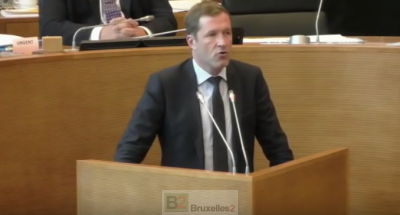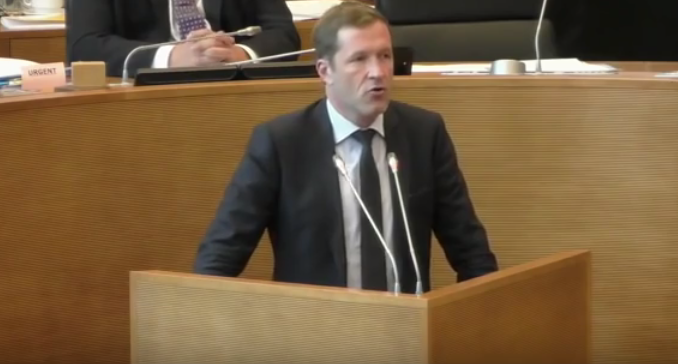Changing the method of commercial negotiation: the Namur declaration

(B2) After the episode of CETA - the trade treaty with Canada - the president of the Walloon region, Paul Magnette, continues in the search for a European alternative. With around forty researchers (mainly from the left), they launched a series of proposals aimed at changing the way the European Union negotiates international trade treaties: the Declaration of Namur.
Insert more democracy
The objective is to insert more democracy and transparency into international trade negotiations, in particular with the organization of a debate prior to the start of negotiations before national parliaments, a detailed report during the negotiations . The principle of provisional application should be abandoned.
Limit the field of competition
The signatories also ask for the complete exclusion of public services and services of general interest from the scope of the agreements, such as the “negative list” method for establishing the scope of activities open to competition.
Prioritize jurisdictions over arbitration
Finally, the authors of this declaration do not overturn any method of arbitration but intend "to favor recourse to national and European jurisdictions", and to "establish an international mechanism for the settlement of disputes only insofar as this has certain advantages”.
Signatories include: Philippe Aghion (College of France), former Hungarian European Commissioner László Andor, former (Belgian) President of the European Investment Bank Philippe Maystadt, Jean-Marc Ferry (University of Nantes ), Jean-Miche De Waele (Free University of Brussels), Olivier Costa (CNRS/Sciences Po Bordeaux), etc. See theall signatories
Declaration of Namur (the text)
The proposals made in this Declaration aim to respond to these legitimate concerns. Inspired by the values of solidarity, democracy and progress on which the European Union is founded, these proposals must, according to its signatories, become the benchmark for any negotiation of an economic and commercial treaty to which the European Union and its Member States are stakeholders. These advances will be the subject of further developments, in the light of the debates that they may give rise to.
This implies that the European Union is not in a position today to negotiate a balanced agreement with the United States given the asymmetry of the partners, particularly as regards the degree of completion of their respective internal markets. , and unresolved issues of extraterritoriality of US law.
This also implies that the EU will have to seek in good faith, with its partners already engaged in negotiations, methods enabling the successful completion of agreements that are already well advanced, a fortiori already signed, in the spirit of this Declaration. .
- Respect for democratic procedures
In order to ensure that the European methods of negotiating trade treaties respect the legitimate demands for transparency expressed by civil society, and the democratic procedures of parliamentary scrutiny, it is necessary to
- conduct contradictory and public analyzes of the potential effects of a new treaty before establishing a negotiating mandate, in order to ensure that it will contribute to sustainable development, the reduction of poverty and inequalities, and the fight against global warming ;
- submit the negotiation mandates to prior parliamentary debate, in national and European assemblies (and regional assemblies with equivalent powers) with regard to mixed treaties, by involving representatives of civil society as widely as possible;
- make the intermediate results of the negotiations public in a timely and accessible manner, so that civil society can take full cognizance of them and that a parliamentary debate can take place before the closure of the negotiations;
- not favoring the “provisional application” method, in order to retain for parliaments their full and entire power of control within the framework of the consent procedure for mixed treaties;
- Compliance with socio-economic, health and environmental legislation
In order to guarantee that the so-called "new generation" trade treaties cannot in any way weaken the legislation which protects the socio-economic, health and environmental model of the European Union and its Member States, and that they contribute to the development sustainable, to the reduction of poverty and inequalities, and to the fight against global warming, it is necessary to
- make the ratification of key human rights instruments, core ILO conventions, recommendations from the Base Erosion and Profit Shifting (BEPS) project and the Paris Agreements on the climate, obligations for the parties;
- include in such treaties quantified tax and climate requirements, such as minimum corporate income tax rates and verifiable greenhouse gas reduction targets;
- completely exclude public services and services of general interest, as defined in the respective legislations of the Parties, from the scope of such treaties;
- exclude the method of “negative lists” to establish the scope of activities open to competition, and systematically provide for clauses allowing the Parties to take over public ownership of a sector without any other conditions than those imposed by national legislation;
- provide for clauses of stand still which prevent the Parties from reducing their social, health and environmental standards in order to promote exports or attract investment, to match these clauses with sanction mechanisms, and to ensure that the compliance of the Parties with their obligations under these clauses cannot no case to base a claim for compensation on the part of investors or other private economic operators;
- include mechanisms for fair and effective cooperation, particularly with regard to the exchange of information, with regard to the taxation of multinationals and offshore companies;
- put in place mechanisms for the independent and regular assessment of the socio-economic and environmental effects of such treaties, and allow their suspension by the Parties (in the eventual phase of provisional application) and their periodic review in order to ensure that they contribute to sustainable development, to the reduction of poverty and inequalities, and to the fight against global warming;
- Guarantee of the public interest in the context of dispute resolution
In order to ensure that the resolution of disputes between companies and States or other Parties to the treaties offers the highest judicial guarantees of protection of the public interest, it is necessary to
-
favor recourse to competent national and European jurisdictions, and only establish an international mechanism for the settlement of disputes insofar as this presents certain advantages (in terms of the uniform application of the treaties, speed and the competence of judges) and includes an appeal mechanism guaranteeing the consistency of decisions rendered at first instance;
-
apply the highest standards to international dispute settlement mechanisms, particularly with regard to the conditions of appointment and remuneration of judges, as well as their guarantees of independence and impartiality, during and after the exercise of their mandate;
-
ensure that judges are fully qualified to interpret and apply trade agreements in accordance with other rules of international law, particularly in the areas of human, labor and environmental rights;
-
ensure equal access to international dispute settlement mechanisms, in particular by adopting measures in favor of SMEs and individuals aimed at alleviating the financial implications of recourse to these mechanisms; These principles must enable the European Union to demonstrate that trade does not serve private interests to the detriment of the public interest, but contributes to bringing people together, to the fight against global warming and to sustainable development, by particularly in the most disadvantaged regions.
Download version FR and release ENG
For signer this declaration
Read also:
- The CETA agreement signed with Canada in French / English
- Paul Magnette the man of No but...
- The bicycle method is dead. The cyclist has fallen!

